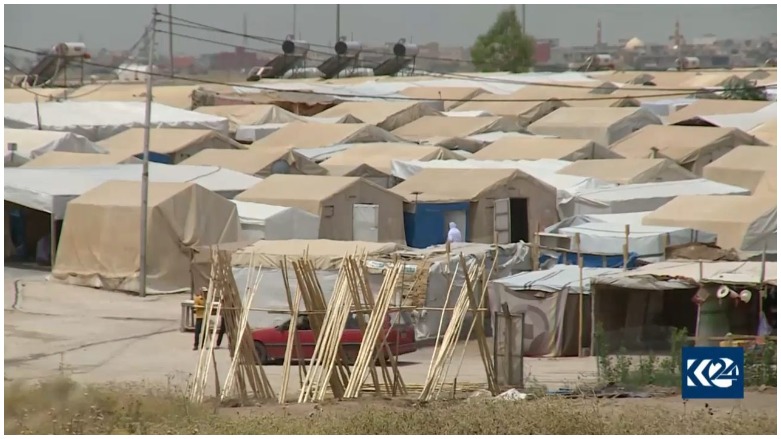Poor security, services in Sinjar force 95 Yezidi families to return to Kurdistan Region camps

ERBIL (Kurdistan 24) – Nearly 100 Yezidi (Ezidi) families that fled the disputed Iraqi district of Sinjar (Shingal) to escape ISIS seven years ago and had since gone home have again returned to a displacement camp in the Kurdistan Region's Duhok province.
The new wave of migration, which has increased over the past month, coincides with the approaching anniversary of the ISIS attack on Sinjar in August 2014 that resulted in the displacement of thousands of families, some of whom are still living in displacement camps.
“A week ago, due to the lack of security, the lack of services, and unemployment, we had to leave our homes again and return to Duhok,” former Sinjar resident Qassim Khodida told Kurdistan 24.
After spending six years in a camp, Khodida, a father of six, returned to his hometown in December, but less than eight months later, he has made the journey again.
"We were very happy to go back to Sinjar because we are tired of camp life," he said. "Everyone loves to live in their homes, but life in Shingal was difficult for us. We were without work and without a source of livelihood, so we were displaced again."
According to the Kurdistan Region’s Joint Crisis Coordination Centre (JCC), there are more than 665,000 internally displaced people (IDP) in the Kurdistan Region, of whom members of the Yezidi religious community constitute 30 percent and more than half of them are from Nineveh province.
According to the JCC’s Directorate of Information Management and Data Exchange that oversees the displaced in the autonomous region of Iraq, since the beginning of July, 95 families, amounting to 472 individuals, have returned from Sinjar to Dohuk.
According to JCC statistics, 2,230 people were displaced in May 2021 from different regions of Iraq to the Kurdistan Region yet again, 2,553 have returned to their homes.
“The reason is due to the instability of the situation in the area, the absence of services and job opportunities," Marewan Hassan, Director of the JCC's Crisis Response and Management office, told Kurdistan 24.
There are currently more than seven different armed forces in Sinjar district, including the Iranian-backed Popular Mobilization Forces (PMF), Ezidikhan security forces, the Sinjar Resistance Units (YBS), the Kurdistan Workers’ Party (PKK), local police, Federal Police, the Iraqi army, the Ezidikhan Peshmerga.
The Kurdistan Regional Government (KRG) and the federal government of Iraq signed an agreement last October to manage administrative and security sectors in the district, with the stated objective of forcing all unauthorized armed groups to vacate the area.
Despite its backing by international actors, including the UN, the groups remain. making the administrative piece of the agreement, to some degree, a moot point.
The KRG announced last week that it had allocated 73 million dinars (50,000 USD) for transportation and accommodation expenses for Sinjar's 12th grade students who will be taking their final exams in Duhok province.
Read More: KRG transports 12th grade Sinjar students to Duhok for final exams, citing security
Education officials previously refused to send the students' exams to Sinjar over what it said were inadequate security conditions.
Editing by John J. Catherine